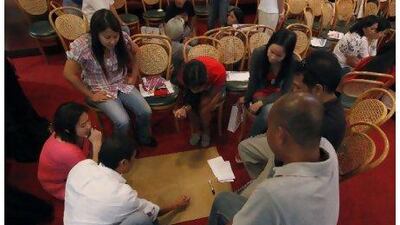DUBAI // A series of paralegal training workshops opened yesterday with discussions focusing on workers who overstay, illegal recruitment and other labour-related and visa problems facing Filipino expatriates.
“I’ve been undocumented for the past 10 years and need help from legal experts,” said a 49-year-old Filipina housemaid in Dubai, who attended the workshop to seek help in legalising her stay in the UAE. “But I would like to use the information from the workshops to help other housemaids, especially those new in the country, who are mistreated by their employers.”
Raquel, who did not want to give her last name, overstayed her housemaid visa after her employer failed to renew it in 2001.
Emily Gonzales, 39, an office manager in Dubai, said the majority of Filipino expatriates lacked information on visa and recruitment issues as well as the country’s laws, and this was compounded by a lack of government support.
“Our diplomatic missions can tap NGOs and community organisations to help disseminate information to our compatriots,” she said.
The workshop organisers, Migrante-UAE and the women’s rights group Gabriela-UAE, are targeting leaders and members of the Filipino community to be part of this pool of paralegal volunteers.
The team will help their compatriots understand their cases better, inform them of their rights, and help them explore their legal options.
“As paralegal volunteers, we need to make people understand their rights,” Yuri Cipriano, the chairman of the UAE branch of Migrante, said.
“When they approach us, it does not matter if they’re guilty. We are not here to judge or blame them.”
One participant, Albert Regencia, 38, an engineer in Ajman, said he was willing to be part of the first paralegal team in the UAE.
“In 2009, some Filipino colleagues who lost their jobs came to me for advice,” he said. “So I would like to learn more about the UAE labour laws and later share my knowledge with others who have visa or labour problems.”
Recently, he was dismayed at the situation of a nine-month-old baby girl who was left in the care of her unemployed Filipina mother in Sharjah without any official documents.
“She was born out of wedlock and the father, who is also a Filipino, abandoned them,” he said. “If the mother wants to return to the Philippines with her baby, my organisation would like to check the legal options available and pay for their air tickets home.”
Yesterday, six Filipino legal consultants in Dubai shared their knowledge about Philippine and UAE labour laws.
Sara, 30, a sales agent in Dubai, said she was concerned about her visa status since her employer failed to apply for her residency visa three years ago. “I like my job but my employer has not applied for my visa,” she said. She has not brought her case to the attention of the Philippine consulate in Dubai or the UAE Ministry of Labour.
“It’s the obligation of the employer to provide you with a visa,” said Jay dela Cruz, a legal consultant in Dubai. “You can approach the Ministry of Labour with your documents and seek their help.”
But Areiz Macaraig, the legal adviser of Migrante-UAE, said the woman had “to weigh her options”. “Remember, the employer can terminate your services any time,” he warned.
The second and third sessions of the paralegal training will be held on July 8 and 15 from 9am to 5pm at Hamarain Centre’s Caravan Restaurant in Dubai.
Topics include the roles and services rendered by Philippine government agencies, and ways to handle cases, prepare an affidavit and incident report and ensure the immediate intervention and resolution of problems, and counselling techniques.

